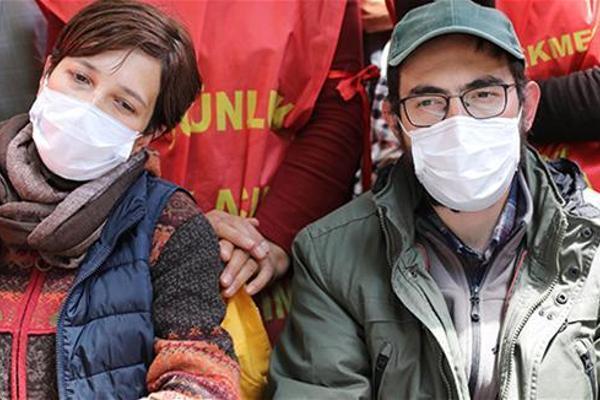Condition of hunger striking Turkish educators ‘deteriorating,’ CHP MPs launch own strike in support
ANKARA


AFP photo
The health conditions of two educators who have been on a hunger strike for over 60 days is deteriorating, while four main opposition Republican People’s Party (CHP) lawmakers have also launched their own hunger strike in support.Nuriye Gülmen and Semih Özakça went on a hunger strike on March 10, demanding to be returned to their jobs, which they lost with a state of emergency decree.
Turkey declared a state of emergency after the failed July 15, 2016 coup attempt, widely believed to have been orchestrated by the Fethullahist Terrorist Organization (FETÖ), and has been issuing emergency decrees ever since.
Gülmen was dismissed from her job at Selçuk University and primary school teacher Özakça was dismissed from his post at the Mardin Mazıdağı Cumhuriyet Elementary School.
CHP lawmakers Orhan Sarıbal, Niyazi Nefi Kara, Mehmet Tüm and Ali Şeker announced on May 10 that they would go on 24-hour hunger strike to draw attention to their rapidly deteriorating health condition.
CHP leader Kemal Kılıçdaroğlu also told his party members that he had conveyed the hunger strikers’ conditions to Prime Minister Binali Yıldırım during a ceremony organized to mark the 149th anniversary of the foundation of the Council of State on May 10.
“These two young people are on a hunger strike. The harm to their lives doesn’t benefit anyone. Good research should be made and they should return to their jobs. My request from you is to research these young people once again,” Kılıçdaroğlu told Yıldırım, daily Cumhuriyet reported.
Yıldırım reportedly told Kılıçdaroğlu that the issue “would be addressed.”
During the Central Executive Board (MYK) meeting of his party, Kılıçdaroğlu also said he spoke to government spokesperson Numan Kurtulmuş on the issue, with Kurtulmuş saying he “has not information on the subject.”
The Ankara Chamber of Medicine, meanwhile, said Gülmen and Özakça had undergone health checks and that their conditions are deteriorating.
“The impairment of their perception, and their motor and mental activities, as well as mood disorders, are striking. Even though they are taking vitamin B support, these are symptoms of Wernicke-Korsakoff Syndrome. Around 10 to 15 percent of Wernicke-Korsakoff patients lose their lives, while 77 percent suffer from serious infectious diseases,” the statement released from the chamber read.
It added that Gülmen and Özakça were refusing to receive treatment.
“We persistently asked Gülmen and Özakça permission to intervene in the event of a loss of consciousness but they have refused countless times,” it also said, adding that they are more prone to catching contagious diseases.
